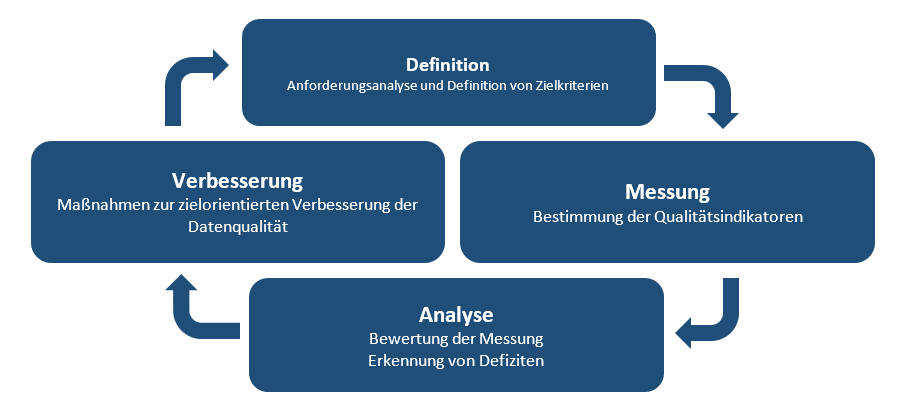Quality of research data
To improve the quality of research data, the CDI offers various services that enable proactive and continuous data quality management for research data. Feedback is generated at different stages throughout the quality cycle which is used as the basis for goal-based optimization.

Definition
Data quality management begins with defining which aspects of data quality need to be improved. The definition of these target criteria for research data is based on project-specific quality criteria and applying FAIR principles:
- Findable
- Accessible
- Interoperable
- Reusable
Researchers develop their project-specific goals with support from training, workshops and courses on research data management. For each research project, the requirements and measures are documented in the Data Management Plan (DMP). The creation of the data management plan is supported with templates, questionnaires and customized sample plans.
Measurement
Quality indicators are collected at both project and university level. The project-specific data quality monitoring is carried out by the researchers themselves. The definition and data collection for quality indicators can be supported, for example, by the use of electronic lab notebooks.
In order to measure the university-wide progress in research data management, a research data census is collected at regular intervals. The criteria collected are based on the standards of funding organizations for the evaluation of research proposals.
Analysis
Based on the measurement results, fields of action in research data management can be identified. Widespread needs can be addressed and prioritized by the CDI in a consolidated manner. Gradually, this creates a spectrum of measures and experiences on the basis of which best practices are developed, which new projects can benefit from.
Improvement
The CDI can initially support researchers with a series of basic services designed to cover typical requirements. Above all, this includes providing tiered storage space via the FAUDataCloud based on requirements. Further services are provided using this IT infrastructure:
- Databases
- gitlab
- jupyterHub
Furthermore, the CDI supports the researchers in setting up and configuring Electronic Lab Books (ELN).
The FAUWissKI cloud has been set up to provide object-oriented and ontology-based systematic documentation of cultural artifacts. FAU researchers can request access to an instance of the WissKI system developed at FAU. The CDI advises on setting up and operating the instance.
